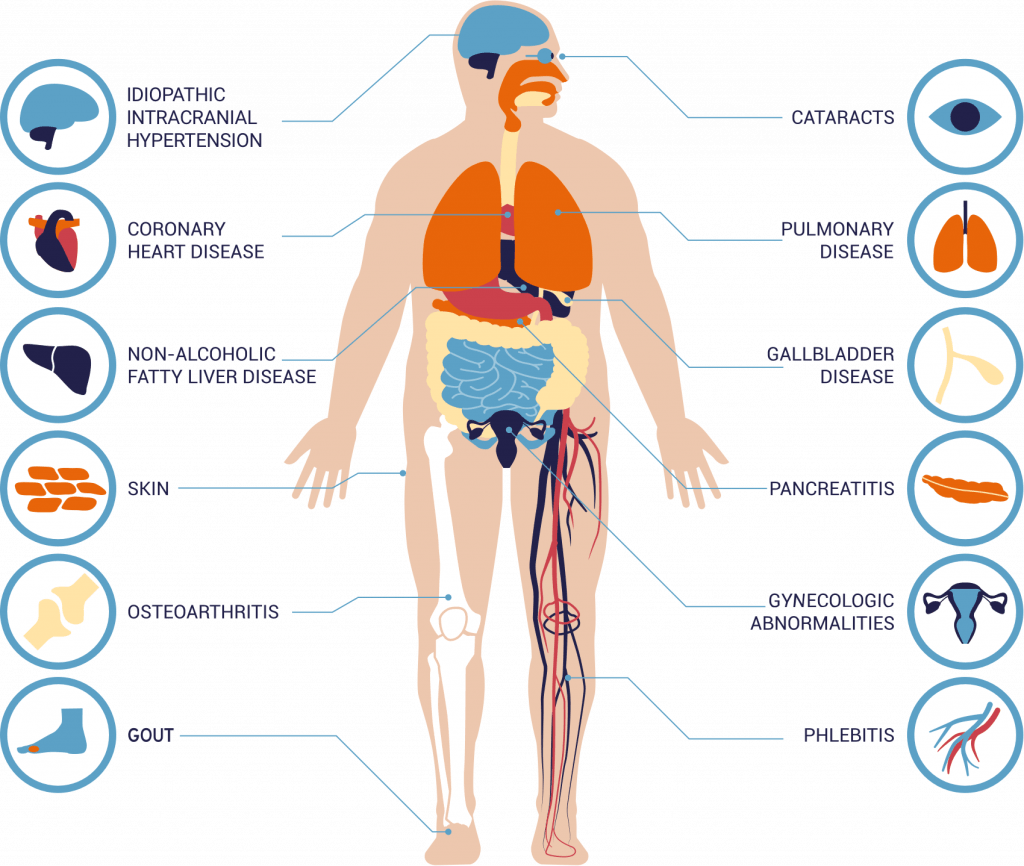Obesity
ERX Pharmaceuticals is developing treatments for obesity, including a first-in-class leptin sensitizer, in an effort to address the unmet need for safe and efficacious obesity treatments.

Obesity is a Serious Disease
Obesity is characterized by many scientists and medical societies as a resilient and complex chronic disease with strong genetic and biological components.1 Patients with obesity are those with a Body Mass Index (BMI) of >30 kg/m2, which includes approximately 40% of US adults, or an estimated 93.3 million people.2 As one’s BMI increases, so does the risk for more than 50 other diseases, including type 2 diabetes, cardiovascular disease, hypertension, some cancers, and non-alcoholic fatty liver disease.3 Individuals with Class II (BMI ≥35 and <40) or Class III (BMI ≥40) obesity are at the highest risk of comorbidities.4 Obesity is also associated with poorer quality of life and adverse mental health outcomes.5
Adverse Health Effects of Obesity

Some of the more than 50 obesity-related diseases
Increasing Obesity in the US and Globally
Global rates of obesity have tripled between 1975 and 20166
About 50% of the US population is expected to be obese by 20307
billion
Some US$190 billion per year, approximately 20% of US healthcare expenditures, is spent on treating obesity and obesity-related conditions8
Obesity is considered one of the leading causes of preventable deaths globally9
Understanding Obesity
Individual genetic and biological factors play a significant role in weight gain and the inability to achieve and maintain weight loss, in addition to an unhealthy diet and limited exercise. The body’s systems for regulating hunger, fullness, fat storage, and energy balance are complicated, and if a part of those systems is not functioning as it should, it can contribute to weight gain and challenges in losing weight.
LEARN more ABOUT how the body regulates feelings of hunger and fullness and energy expenditure
Treating Obesity
Many individuals would benefit from pharmacologic support to help them lose weight. While lifestyle interventions can reduce body weight, weight regain is common. Current treatment options generally have limited weight loss efficacy, and/or side effects which may limit duration of treatment, leaving patients short of achieving and maintaining a healthier weight. An ideal weight loss therapy would be safe and well-tolerated and help people to achieve greater than 10% weight loss, leading to beneficial effects on weight-related comorbidities.10
ERX seeks to address the unmet needs in obesity through the development of weight loss therapies with a novel mechanism of action.
References:
- ANIH. Managing Overweight and Obesity in Adults. 2013.
- National Center for Health Statistics
- US Department of Health and Human Services National Heart, Lung, and Blood Institute. Managing Overweight and Obesity in Adults. 2013.
- Pantalone KM, et al. BMJ Open. 2017. 7:e017583. doi:10.1136/bmjopen-2017-017583.
- Centers for Disease Control and Prevention. The Health Effects of Overweight and Obesity. 2015.
- World Health Organization. Obesity and Overweight. 2018. Available at https://www.who.int/news-room/fact-sheets/detail/obesity-and-overweight.
- Wang YC, et al. Lancet. 2011;378:815-25.
- Pharmacoeconomics. 2015 Jul; 33(7): 673–689. doi: 10.1007/s40273-014-0243-x
- Centers for Disease Control and Prevention. Adult Obesity Causes & Consequences. 2017.
- US Department of Health and Human Services National Heart, Lung, and Blood Institute. Managing Overweight and Obesity in Adults. 2013.